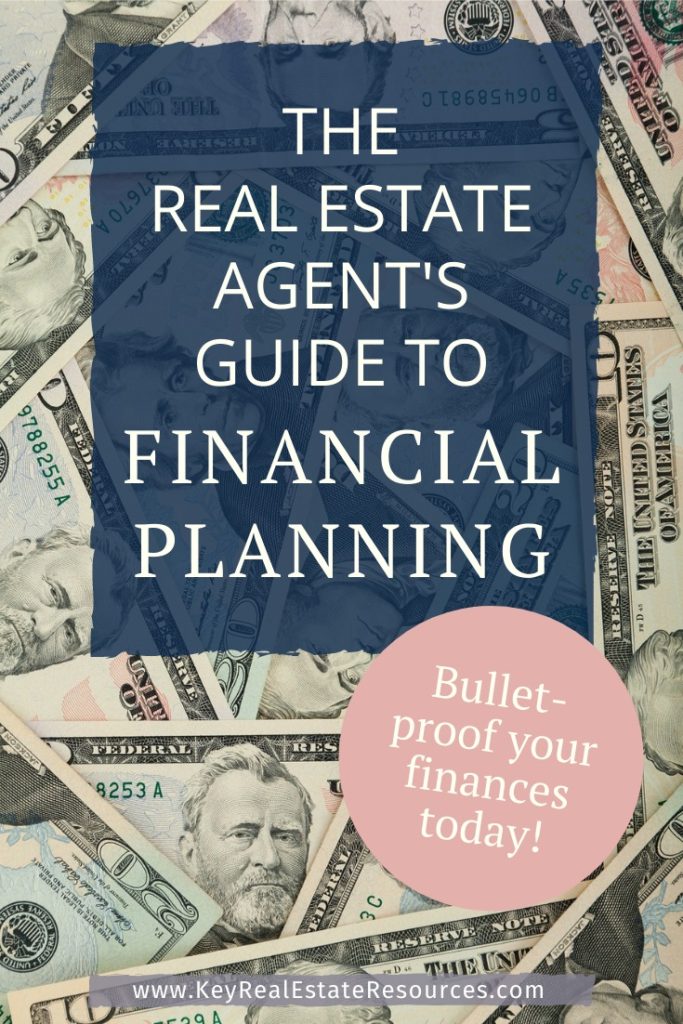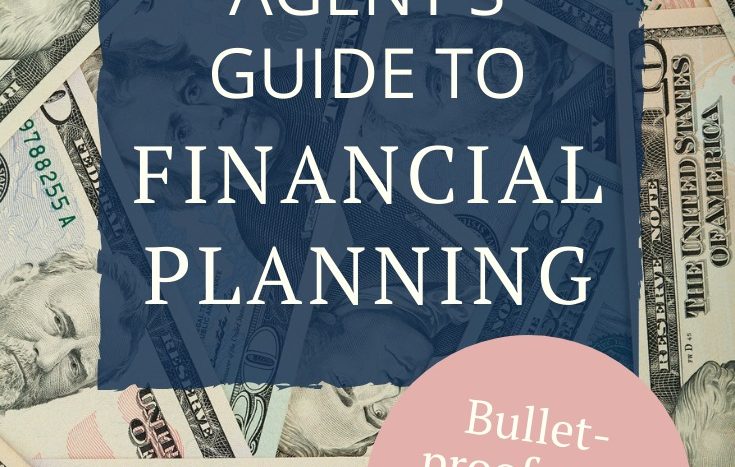Having a solid real estate agent financial plan can mean the difference between success and failure. You don’t get a steady paycheck. You probably don’t have health benefits through your broker. And there’s no employer-sponsored retirement account waiting for you either. Plus, you’re responsible for paying your own quarterly income taxes.
It’s a lot to manage!
You need a bullet-proof real estate agent financial plan that will see you through the feast and the famine and help you navigate the many expenses and savings accounts you need as an agent.
This post will show you how to create your own bullet-proof financial plan in 5 easy steps!

How to Create a Bullet-Proof Real Estate Agent Financial Plan
To begin, you’ll need a way to track your finances. Freshbooks is my personal recommendation for agents who want a software program to quickly and easily track their financials.
But you certainly don’t need to pay for a fancy software program. You can always pick up an inexpensive printable financial template on Etsy for immediate download. Or you can create your own spreadsheet from scratch if you have the time and the know-how. Whatever works best for you!
With that, let’s get to it!
Step 1: Review Your Performance from the Past Year
To know where you’re going, it helps to know where you’re coming from.
Reviewing your financial performance from the past year will give you an idea of what to expect (in terms of income and expenses) for the coming year.
Quick note about expenses: As an independent contractor, you have more than just personal expenses to consider. You also need to consider business expenses. We’ll discuss both.
If this is your first year in real estate, your prior year data won’t include relevant business expenses or reliable income figures. You’ll just need to spend more time researching average income and expense data in Step 2. But you will still benefit from reviewing last year’s personal expenses so you’ll know how much to budget in those categories for the coming year.
Expenses
Most agents find it helpful to look at the expenses first when reviewing their financials. When your income is uncertain, starting with your expenses lets you know exactly how much income you need to make to cover all your needs. So we’re going to follow that method by listing expenses first.
Now, I like to start with personal expenses since many of these are essential to your life, regardless of the current state of your business.
Personal expenses include:
- Housing
- Utilities
- Personal Vehicle
- Food
- Personal Care
- Insurance
- Debt Payments
- Savings and Investments
- Charitable Giving
All you need to do is list all your personal expenses and assign an amount to each. You may find it helpful to list both the annual total amounts, and the average monthly amounts.
Then you can move on to your business expenses.
Business expenses include:
- Work Vehicle
- Work Cell Phone
- Office Space (if not covered by your Broker)
- Marketing
- Website Hosting
- Signage
- Membership Dues
- Client Gifts
- Federal and State Income Taxes
If you’re new to real estate, you’ll need to account for a few start-up costs as well:
- Licensing fees
- A real estate website (a must for today’s serious agents)
- Any on-boarding fees charged by your broker
- Business cards
- Initial self-promotional marketing
If you feel like your expenses are too high in any category, ask yourself if it’s reasonable to cut back on that expense in the coming year. If so, great! And if not, at least you’ll know to budget enough for that category in the coming year.
Income
The bulk of your income will, in all likelihood, come from real estate transactions. But this shouldn’t be your only source of income.
Savvy agents are diversifying their income streams to recession-proof their businesses and reach financial independence. Check out our massive list of 55 Ways to Make Money in Real Estate for some income ideas that will compliment your real estate business.
Just like you did with your expenses, list your income sources from this past year and the amounts earned from each source.
Profit
Your income minus your business expenses equals your profit.
How did you do last year? Are you satisfied with last year’s profit? Or do you need to lower your business expenses, increase your income, or both to reach a profit you’re happy with in the coming year?
Cash Flow
Your income minus your total expenses (personal and business) is your cash flow. This shows how much more money you make than you spend.
As long as you’re including savings and investments in your expenses (which you absolutely should be, otherwise those will end up neglected!), your cash flow number doesn’t need to be large. You just want to be sure you’re making more than you’re spending.
If there’s anything you don’t love about your financials from the past year, don’t panic. Instead, focus on what you want to do differently in the next 12 months. That’s what we’ll do in Step 2.
Step 2: Plan Your Financials for the Coming Year
Now it’s time to create your real estate agent financial plan for this coming year.
- How much do you plan to spend?
- And how much do you plan to earn?
Expenses
Using last year’s expenses as a guide, write down your estimated expenses in each category for the coming year. You may have to do a little research to get estimates on some figures if this will be your first year incurring that particular expense.
The most important thing when estimating your expenses is to be as accurate as possible. Many of us have a tendency to think our numbers should be lower, so we underestimate our expenses, and subsequently end up breaking our budget.
A good rule of thumb is to budget high. If you come in under budget, great! You’ll have more money at the end of the year to invest in business expansion.
Income
With your expenses calculated, you now know exactly how much money you need to make this year to cover all your expenses.
How does that number line up with last year’s income?
Do you expect this year’s income to be similar?
Again, accuracy is key. Your income goal should be achievable, but it should also be difficult enough to really make you work.
By the way, in the next step, we’ll create a plan to make your income goal a reality. That step will be a good litmus test to see if your income goal is reasonable.
Profit
Assuming you hit your planned expense and income figures this year, what will your profit be? Again, it’s just income minus business expenses.
How does this projected profit compare to last year’s profit? Are you happy with this profit? If not, now’s the time to review your projected expenses and income to see if you need to make any adjustments.
Cash Flow
When you subtract your total expenses from your projected income, are you still at a positive number? Because you need to be!
Step 3: Create a Plan to Meet Your Income Goal
Now that you have an income goal in mind, we need to create a bullet-proof plan to hit that goal.
To do this, we need to answer 2 questions:
- How many homes do you need to sell this year to meet your income goal?
- How many leads do you need to reach to sell that many homes?
Let’s look at each question in turn.
How Many Homes Do You Need to Sell?
Here’s the formula to calculate the number of homes you need to sell:
Income Goal
————————————————————————————————
(Average Home Price x Your Average Commission Percentage x Your Commission Split)
For anyone not algebraically-inclined: we’re just figuring out your after-broker commission from an average sale. Then dividing your income goal by that number.
As an example:
If the average home price in your niche is $250,000, the average commission per agent is 3%, and your split with your broker is 50%, you would need to sell 27 average homes to generate $100,000 in gross income. ($250,000 times 3% = $7,500 x 50% = $3,750. So you make $3,750 on each average transaction. And $100,000 divided by $3,750 is 26.666 houses, rounded to 27.)
So, what’s your magic number?
Now, how are you going to meet that sales goal?
How Many Leads do You Need to Reach?
First, let’s break down your home sale goal by month so it’s less daunting. Divide your magic number by 12 to figure out how many homes you need to sell each month on average.
Now, how many leads to you need to reach each month to sell that many homes?
To figure this out, you need to know your conversion rate. How many leads does it take on average to close a single deal? For seasoned agents, this is a matter of tracking your leads and your closed deals to know your personal conversion rate. For new agents, 100 leads for every 1 closed deal is a safe estimate in most markets. This number will improve as you gain sales experience and establish yourself in the market.
Here’s the formula for calculating your monthly lead requirements:
number of deals needed x number of leads required to make one sale
That number may seem high. But let’s make it more manageable by figuring out how many leads you need to generate each day. To do that, divide your required leads per month by 16. Why 16? Because life happens, and you can’t reasonably expect to prospect every day of every month. So we’re figuring 4 workdays for 4 weeks per month.
As long as you commit to hitting your prospecting target 4 days per week, there’s no reason you shouldn’t hit your income goal!
Step 4: Tracking Your Finances
This is one of the most often ignored steps in creating a real estate agent financial plan: tracking.
How will you know if you’re on track to stay on budget and meet your income goal if you don’t track your finances through the year?
Unexpected expenses and sales droughts can completely derail your financial plan. It’s important to catch these in real time so you can adjust your plan as needed to get back on track as quickly as possible.
Keep a monthly log for expenses, and one for income. And actually use them! That’s the tricky part. It’s a good idea to schedule 15-30 minutes each week specifically to log your income and expenses from the previous week. Put this recurring appointment in your calendar to remind you to build this financial habit.
Step 5: Long-Term Planning and Tracking
The final step to creating your bullet-proof real estate agent financial plan is to create a long term financial plan.
Long-term financial planning is difficult for real estate agents. It’s hard enough to plan for a single year. How are you supposed to plan 5-10 years (or more!) into the future?
No one expects you to accurately forecast your income and expenses for the next 10 years. But there are some long-term financial plans that wise agents track.
Retirement
You don’t have a 401(k) or a pension plan. So you must plan for retirement.
A Solo 401(k) is a great option because it allows you to contribute more each year than IRAs.
The key to retirement savings is to start early and save consistently. Compound interest will work its magic from there.
Aim to set aside a full 10% of your gross income for retirement. But start slowly if 10% sounds like too much for you to spare. Start with 3% of every transaction for the first year. Then 5% the next year. And keep increasing until you hit 10%. If you’re starting retirement savings later in life, you may need to save more. If you have other income-generating assets, like rental properties, you may be able to save less. Talk to a Certified Financial Planner (CFP) if you need help figuring out your retirement plan.
Your Dreams
It’s sad that most of us put such a low priority on our dreams.
How many of us desperately want to travel, or open our own brokerages, or start a non-profit for the community? And how many of us never do these things because we just don’t have the money?
Make your dreams a priority by building them into your financial plan every year. And tracking your Dream Fund finances over the long-term.
Your Legacy
What do you want to leave for the next generation?
You certainly don’t need to leave an inheritance for your children, but you may want to help your children and/or grandchildren with education expenses as your legacy. Maybe you want to create a family business to leave behind? Or build a community park for future generations to enjoy. Or establish a non-profit to assist those that come after you.
If you want to leave a legacy like these, you’ll need to include them in your long-term financial planning.
Your Net Worth
Tracking net worth year-over-year is one of the most rewarding financial exercises you can do!
Net worth is the best indicator of overall financial health. It’s a comparison of your debts to your assets. Think of it like this: if you sold everything you owned and paid off all your debts today, how much would you have left?
To calculate your net worth, start by listing all your assets and their present-day values:
- Checking Accounts
- Savings Accounts
- Retirement Accounts
- Investment Accounts
- Real Estate Holdings
- Vehicles
- Collectibles
Now, list all the current balances on all your debts:
- Mortgages
- Student Loans
- Auto Loans
- Credit Cards
- Business Loans
- Personal Loans
And finally, subtract the debts from the assets. The result is your current net worth.
The more assets you accumulate, the more your net worth will skyrocket. Especially if you acquire assets that appreciate like real estate and financial investments (like stocks and bonds).
Invest the time in calculating your net worth just once or twice per year. The motivation to improve your finances lasts long after you complete this small task. And as your net worth grows, you’ll find that you’re actually excited to calculate your new net worth and see how much your financial health has improved since the last check.
Resources
For an introduction to personal finance, check out The Index Card: Why Personal Finance Doesn’t Have to Be Complicated. This book was written by Harold Pollack, the guy made famous for writing everything you need to know about personal finance on a single index card.
And if you need a template to create your real estate agent financial plan, check out The Ultimate Real Estate Agent Financial Planner on Etsy.











